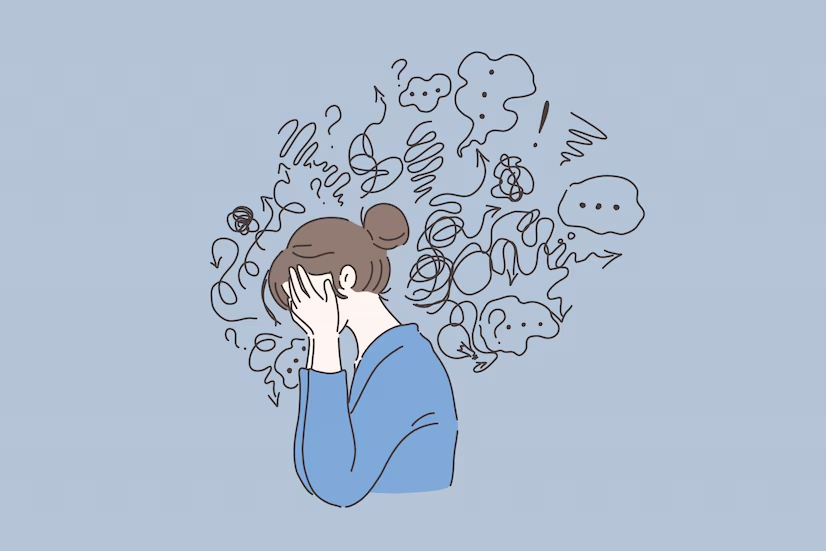
The root cause of mental health problems starts with your thoughts. The flow of uncontrolled thoughts can lead to several minor to major mental health issues. Cognitive distortion is one such type of thinking process which can lead to anxiety, stress and other mental health issues.
Table of Content:-
Cognitive distortion are thoughts which are not based on reality or facts, most of them being negative. In this, a person tends to think or perceive reality inaccurately due to being exaggerated or irrational. For instance, if a friend, family member or a loved one is not responding to your calls and it has been a while, there’s a high possibility that negative thoughts will take over your mind.
In order to get a detailed understanding on cognitive distortion and how it affects your mental health, OnlyMyHealth team interacted with Priyal Awasthi, Psychologist, Transform Happily, Bengaluru.
What is Cognitive Distortion?
Giving a simple explanation, Priyal Awasthi said, “You can think of them as errors of thinking.” According to the American Psychological Association (APA), cognitive distortions are faulty or inaccurate thinking, perception, or beliefs.
Harvard Medical School defined cognitive distortion as internal mental filters or biases that increase our misery, fuel our anxiety, and make us feel bad about ourselves. Our brains are continually processing lots of information.

As per Awasthi, these distortions involve systematic errors in the way people perceive, interpret, and process information. Some common examples include:
1. All-or-nothing thinking: Seeing things as entirely black-and-white, with no shades of gray in between.
2. Overgeneralization: Drawing broad conclusions from a single event or piece of evidence.
3. Mental filtering: Focusing only on the negative aspects of a situation while disregarding the positive aspects.
4. Catastrophizing: Expecting the absolute worst-case scenario and blowing things out of proportion.
5. Personalisation: Assuming that everything is a reaction to you, even when it's not personal.
Often, such irrational thoughts are so ingrained in people's thinking patterns that they are imperceptible, making them dangerous for their well-being and ability to reason emotionally.
Also read: What Is Catastrophising And How Does It Affect You?
Signs of Cognitive Distortion

If you notice these signs frequently or they're significantly impacting your mood, behaviour, or well-being, then it's time to seek help. Awasthi helped us list these symptoms of cognitive distortion.
1. If you find yourself frequently thinking in absolutes like "always " or "never," or viewing situations as entirely good or bad with no middle ground, this could be a sign of all-or-nothing thinking or black-and-white thinking distortions.
2. If you tend to automatically assume the worst-case scenario or blow things out of proportion, you may be engaging in catastrophizing distortions.
3. If you let one single negative event decide your worth or generalise it as a pattern of failure or inadequacy, you may be overgeneralizing.
4. If you frequently engage in harsh self-criticism or put yourself really down, this could be a sign of cognitive distortions.

5. Your emotional reactions seem exaggerated or out of proportion to the situation, and you're bursting out over trivial things which you would ideally let go of.
6. You struggle to consider other viewpoints or interpretations, and your perspective seems rigid or inflexible.
7. Physical symptoms: Cognitive distortions can sometimes manifest in physical symptoms like muscle tension, headaches, or a rapid heartbeat, as they can contribute to increased stress and anxiety.
Adding, Awasthi said, “If you're experiencing these signs, it may be helpful to seek support from a therapist or counsellor to address and challenge these distorted thought patterns.”
Also read: Expert Lists Things You Should Know Before You Go For Depression Screening
Consequences of Cognitive Distortion

Explaining the consequences cognitive distortion can cause, Awasthi said, “Cognitive distortions can create a negative cycle where distorted thoughts lead to unhelpful emotions and behaviours, which then reinforce the distorted thinking patterns. This can significantly impair daily functioning, well-being, and life satisfaction.”
Some specific mental health issues that can stem from cognitive distortions are depression, anxiety disorders, eating disorders, obsessive-compulsive disorders, and so on, along with making the individual more susceptible to stress, worry, and low self-esteem.
She further added, “Emotionally, it can pave the way for negative emotions like sadness, anger, frustration, emotional instability, mood swings, and an overall difficulty in regulating emotions.”
All of this combined leads to high problematic levels of avoidance, procrastination, social withdrawal, and strained relationships. Therefore, it's very essential to seek help if you feel you're unable to cope with daily challenges.
Also watch this video
How we keep this article up to date:
We work with experts and keep a close eye on the latest in health and wellness. Whenever there is a new research or helpful information, we update our articles with accurate and useful advice.
Current Version